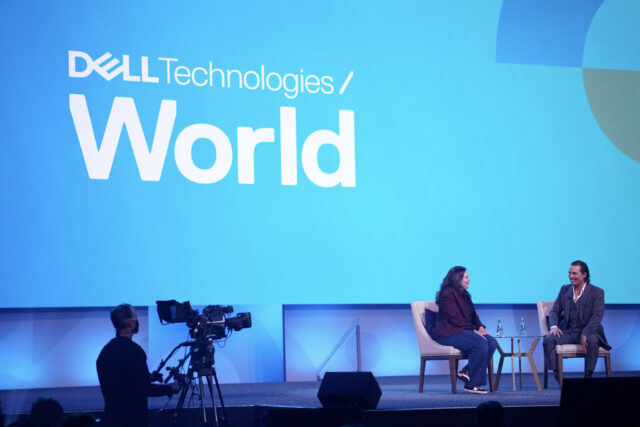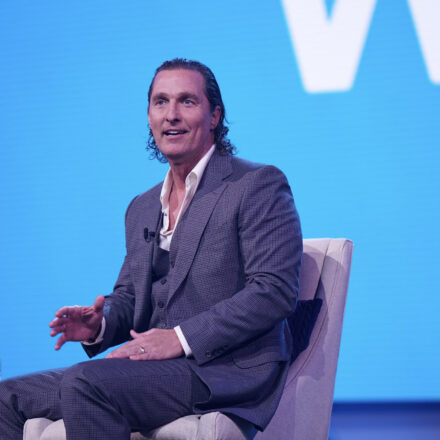By Sara Downey and Sara Kleinsmith, thought leadership, Dell Technologies
It’s no surprise that Oscar-winning actor, tech investor and New York Times bestselling author Matthew McConaughey can command a room. At Dell Technologies World, when Allison Dew, Dell’s CMO, asked McConaughey for his two cents on what problems he thinks technology can solve, he paused, looked down, took stock of a really big question and said: “Let’s unpack that a minute.”
 He then, with an outstretched arm, slowly repeated the now rhetorical question: “What problem does technology solve?”
He then, with an outstretched arm, slowly repeated the now rhetorical question: “What problem does technology solve?”
He answered swiftly, resolutely and with clarity: “It’s a tool.”
Pondering further, he posed his own question: “Does technology really do the solving?” To which Dew replied, “No, I think people do the solving.”
In agreement, he recalled: “Well I’ve spoken to many technology companies, and I’ve said: ‘You’re creating the new Eden…What’s the mission statement?’ You know what they say: ‘The algorithm will tell us.’ That scares the bleep out of me.”
What followed in this fireside chat between McConaughey and Dew was a fascinating and charismatic commentary on the power of technology—as a tool, to democratize access to information, bring people together and build empathy.
He acknowledged that people don’t always use technology for these noble purposes but maybe we can agree to program a set of values into our technology. So, the technology reminds us and inspires us to care for people. These values can then become a form of currency. That’s one of his visions of the future.
Using technology for recovery
Listening to the exchange, it was clear that McConaughey believes passionately in the power of technology to affect positive change when wielded for good. This is why he now devotes his time to projects that endorse his values by furthering restoration and advancing sustainable innovation. If they don’t meet this criterion, they don’t justify his time and resource.
Unite Us is one organization that did pass the McConaughey test. Devoted to helping people gain access to healthcare via telemedicine, a need that became urgent during the pandemic, Unite US is an example of an organization that’s using technology as a tool for restoration, with long-term viability.
Tee-up for future success

McConaughey also spoke evocatively about his 2020 New York Times bestselling book, “Greenlights,” which advocates being “cool to your future self; teeing yourself up for success…based on the choices we make.”
He explained that, in contrast, red lights are obstacles that result in a complete stop. Crisis, death, disease, Covid-19 and the Great Resignation are all examples of red lights, according to McConaughey. They’re not pleasant but sometimes we need them to stop us in our tracks, so we can reconsider our choices based on new insights gleaned.
After recalibrating, reevaluating and resetting via “yellow lights,” a path forward may present an even better journey than the one originally intended. We can place ourselves at the greenlight again.
Creating an inclusive, healthy workforce
This appreciation for all experiences, all behavior types echoes our own recent study: “Breakthrough.” Dell worked with behavioral experts to benchmark senior leaders, IT leaders and members of the workforce based on their readiness for digital change, because, like McConaughey, we know that digital transformation doesn’t just happen—it needs a human-machine partnership. It needs people to embrace the technology and use these tools responsibly.
Based on their analysis, only 10% of the respondents were placed in the Sprint group, which means that they’re chasing innovation and trailblazing change. Pretty much half are in the Slow and Still groups.
That’s not an indictment. All groups are welcome in the modern workforce. Someone’s inclination to question and show caution may be entirely warranted. As McConaughey observed, there’s great merit and wisdom in interrogating an idea and taking the time to learn from past failures.
However, to channel these traits in a positive way, we need to provide sufficient encouragement and autonomy. McConaughey talked about leaning into our successes more (rather than dwelling on what went wrong).
Why is this important? Because as Dew said: People solve problems. But to do that, they need to feel supported by leadership and the culture they set, and by technology, which, as McConaughey noted, “held us together during the pandemic.”
There’s a lot of work to be done. After a tough couple of years, people are feeling bruised. According to “Breakthrough,” 41% believe staff are wrestling with burnout and/or poor mental health that’s impacting their ability to deliver their work. But as McConaughey pointed out, history shows that after cycles of great change, innovation quickly follows. Burnout in the workforce, a growing gap in access to technology and a lack of consensus on the road ahead have left the world weary. But a resurgence is possible.
Keeping legacy in sight
McConaughey wants to be part of the recovery. Which is why he always asks himself before he runs headfirst into a new project:
- Is this something the world needs?
- Is it a legacy choice (for my kids, for the future, for the environment)?
These are great questions. What if every leader and organization use these questions as a litmus test for their next breakthrough innovation? McConaughey believes that when you combine these, with “chasing yet”—that future accomplishment that you might articulate in your mission statement, a headline you set for yourself, even your imagined eulogy—you can find your green light. Or in Dell speak, you can break through.
After a two-year, in-person hiatus in Vegas, there have been so many highlights at the 2022 Dell Technologies World. This conversation with Matthew McConaughey was most certainly one of them.

